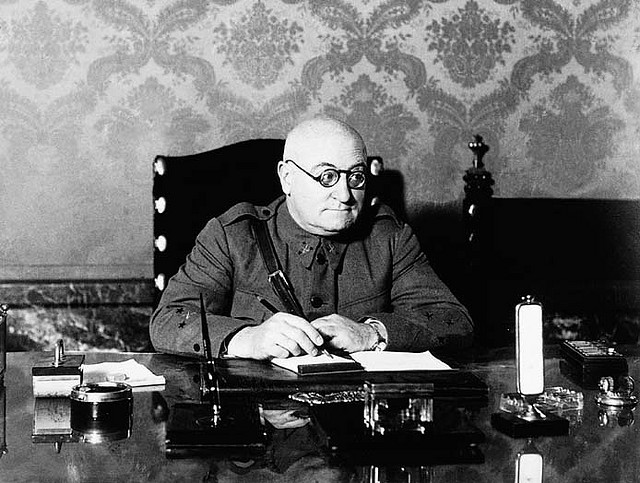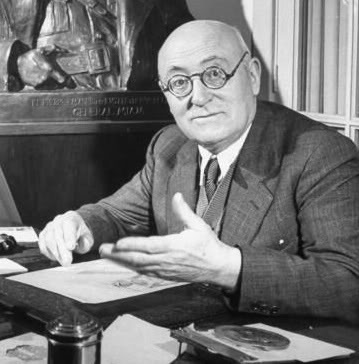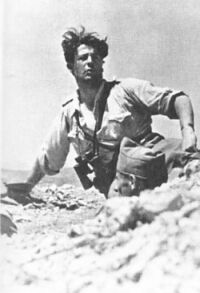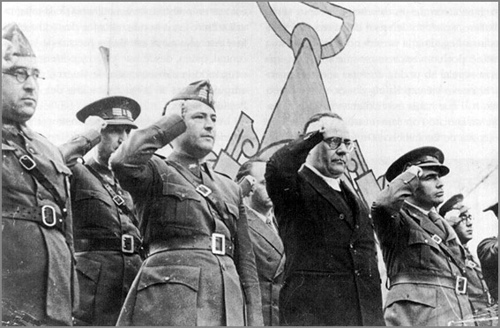<Back to Index>
- General of the Spanish Army José Miaja Menant, 1878
- Head of the Central Army Juan Modesto Guilloto León, 1906
PAGE SPONSOR


José Miaja Menant (Oviedo, Asturias, 20 April 1878 – Mexico, 14 January 1958) was a Spanish Army Officer in the Second Spanish Republic.
He entered the Infantry Academy at Toledo in 1896. His first post was in Asturias. Miaja was later transferred to Melilla where he served in the Moroccan War of 1900, achieving the rank of major comandante in 1911, and rising to General in 1932. Despite Miaja's membership of the right wing Unión Militar Española, in 1935 conservative minister of War, José María Gil - Robles y Quiñones, sent him to Lérida, a relatively obscure posting far from the capital, an indication that he did not have the full confidence of the government.
At the start of the military rebellion that lead to the Spanish Civil War, he was stationed in Madrid, remaining loyal to the Republican government and was appointed Minister of War. In November 1936, he was named commander of the Junta de Defensa (Defense Council) for Madrid, when the government evacuated the capital before the imminent arrival of Nationalist troops. With Vicente Rojo Lluch as chief - of - staff, he managed to halt the Nationalists at the river Manzanares at the Battle of Madrid.
As commander of the Central Zone, he directed the battles of the Jarama, Guadalajara and Brunete. He later supported the rebellion led by Segismundo Casado against the government in March 1939, heading the Council of National Defense (Consejo Nacional de Defensa).
After the end of the Civil War, he went to Gandia, where he boarded a British ship that took him into exile, first to Algeria and France, then to Mexico, where he died on 14 January 1958.


Juan Modesto Guilloto León (El Puerto de Santa María, Cádiz, 1906 – Prague, Czechoslovakia, 1969) was a Republican army officer during the Spanish Civil War.
He originally worked at a sawmill before joining the Spanish Army. He served in Morocco, becoming a sergeant major of the Legion.
He was affiliated with the Communist Party of Spain (PCE) from 1930, and he was placed in charge of the Milicias Antifascistas Obreras y Campesinas (MAOC) of Madrid in
1933, which constituted a paramilitary force for the Party. He
organized the Sindicato de Oficios Varios y el Socorro Rojo (dealt with
relations with the Socorro Rojo Internacional).
When the Spanish Civil War broke out in July 1936, he participated in the assault of Cuartel de la Montaña, and fought in the Madrilenian Mountain Range. He was one of the heads of 5th Regiment (commanding it from October 1936). He fought in Talavera de la Reina and Illescas (September 1936) and in the defense of Madrid, as well as in the Battle of Jarama (February 1937).
He was promoted to lieutenant colonel of the popular army and commander of 5th Army Corps, participating in the battles of Belchite, Brunete (July) and Teruel (January 1937 and December 1938). In 1938, he was promoted to colonel and became head of the Army of the Ebro.
After the fall of Catalonia to the Nationalist army, Negrín named him general and head of the Central Army on March 2, 1939.
After the Casado's coup, on March 6 he left Spain in an airplane. Then he went to the Soviet Union, whose government recognized his military rank.
During World War II, he served with the Red Army and the Bulgarian Communist forces. Defeated in the struggle with José Díaz for control of the PCE, he went to Prague.
Modesto wrote a book about his experience during the war in the 5th Regiment, titled Soy del Quinto Regimento (English:I am of the Fifth Regiment), published in Paris in 1969.